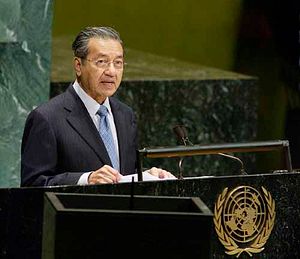This week, Malaysian Prime Minister Mahathir Mohamad is on his first trip to the United States since the Pakatan Harapan (PH) government’s shock election victory in the Southeast Asian state’s election in May. While the premier will not be paying a visit to Washington, D.C. for a meeting with U.S. President Donald Trump, his engagements during his time in the United States will nonetheless be closely scrutinized for indicators as to the future direction of U.S.-Malaysia ties following his return to power.
Since the start of the relationship following Malaysia’s independence, United States and Malaysia have often found ways to cooperate on a range of issues under six prime ministers since the despite disagreements on matters such as economic policy, human rights, and U.S. foreign policy in the Middle East. However, during Mahathir’s tenure in particular, which lasted from 1981 to 2003, U.S.-Malaysia relations were especially fraught with tensions over a range of issues even as aspects of cooperation continued at the working level, including on the defense side.
In the decade and a half that Mahathir was out of power, U.S.-Malaysia relations saw a significant boost. Particularly during the last decade under his predecessor Najib Razak in particular, while irritants and challenges had remained, the two countries had elevated their ties to the level of a comprehensive partnership, with former president Barack Obama paying the first visit by a U.S. president to Malaysia in nearly a half-century. While there were certainly initial challenges posed by the election of Donald Trump, those seemed to have been managed well up until Najib’s ouster in elections in May (See: “The Real Test for US-Malaysia Relations in the Trump Era”).
Mahathir’s return to power has raised questions about whether this could lead to a reversion to the U.S.-Malaysia relationship during his tenure, where tensions at the leader level would coexist with good ties at the working level. Though this is a rather simplistic suggestion, the fact that high-level engagements and visits have occurred over the past few months – from Secretary of State Mike Pompeo’s meeting with Mahathir in Malaysia in July to Defense Minister Mohamad Sabu’s meeting with U.S. Defense Secretary Jim Mattis in Washington, D.C. on Monday – without any meeting between the two leaders and amidst some anti-Trump comments from Mahathir, has nonetheless fed that perception.
To be sure, a complete return to the past is unlikely, even if it is a convenient extrapolation exercise. Far too much has changed since then, including Malaysia’s position in the world, the region it finds itself in, Mahathir’s own position in the new government, and the sheer complexity of the relationship as ties have grown. It is also far from clear what impact a meeting between Trump and Mahathir would actually have on the relationship if it occurs sooner than both sides actually have found their footing on ties.
Nonetheless, even without an actual meeting with Trump, Mahathir’s engagements in New York – which will include his address at the UN General Assembly and sideline meetings; meetings with U.S. companies; speeches at think tanks; and a gathering with Malaysians – will shed light on Malaysia’s foreign policy under the new government and the opportunities and challenges that presents for U.S.-Malaysia relations. While some aspects of these engagements may suggest areas of convergence, others, such as the Trump administration’s approach to the Israel-Palestine issue or Iran, could not only expose aspects of divergence but also further widen the gulf between the two sides.
Of course, in spite of the media headlines these engagements generate, they will only be one chapter in the evolution of the wider U.S.-Malaysia relationship. It is still early days in the evolution of Malaysia’s new PH government, and it remains to be seen whether both sides can successfully manage some of these and challenges, and whether Trump will eventually meet Mahathir during his time in office.
Furthermore, for all the focus on Mahathir himself, it is worth noting that there is an understanding that he will not remain in power beyond a certain time as he is to step aside to make way for Anwar Ibrahim. All this suggests that the evolution of U.S.-Malaysia relations will continue to be an interesting storyline to watch.
































